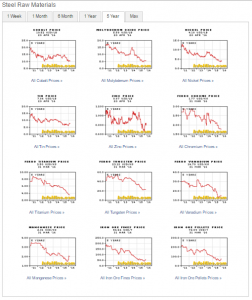In the 2016 Craft Brewers Industry Report we wrote that breweries that actually own their kegs (versus leasing them) are actually at a competitive advantage to their peers who lease kegs. This may come as a shock to many breweries and so here is our logic with that statement.
- Kegs are relatively cheap assets and should be getting cheaper. Keg prices fluctuate with the metal prices. Right now metal is super low and it looks like it will stay that way for a while. Just look at the image below from http://www.infomine.com/investment/metal-prices/ which shows the 5 year prices for steel.

- Increasing the brewery assets increases the value of the brewery. If you needed to sell your brewery or take a loan out, financial experts calculate what’s known as the Enterprise Value (EV). EV = market value of common stock + market value of preferred equity + market value of debt + minority interest – cash and investments. The idea being the purchaser of a brewery will need to pay the debts already incurred by the brewery but then get to pocket the cash and assets. By comparing the EV and EBITDA (basically net income) in various formulas the purchaser can forecast what’s known as “free cashflow” and estimate a true purchase value of the brewery. Long story is if you have a lot of debts and little assets and your net income isn’t great then you will certainly have a lower value for your brewery. Owning a sizable keg fleet will only help increase you brewery value because it is an asset as compared to the cash draining re-occurring expense of leasing.
- The Operating costs of owning kegs can be massively optimized. The secret to optimizing your operations is to first manage them and track them. Once you know the average throughput rate of your kegs your can begin to put goals and systems in place to shorten the duration and utilize the assets more effectively.
- Should the industry see a downturn the value of owned kegs increases. More specifically if a brewery owns it’s kegs and needs to liquidate or close the value of the kegs can help increase the value of the sale to another company as we previously saw. In an industry downturn this is likely to happen more frequently. Owned kegs also provide a competitive advantage to the breweries still in operations (if their operation is optimized) because in that business season there’s likely to be a lot of kegs floating around for sale. Operating Breweries will be able to acquire these kegs for dirt cheap and eliminate overhead of keg leases that other breweries who “don’t know how to utilize keg assets properly” have to incur. The result is the brewery that owns their kegs will have cheaper unit costs.
- Leasing kegs is a great business to be in. The translation to of this statement is that if a keg leasing company is doing great that means they are able to optimize their operations and create value for the industry. That’s how you get customers. However, in this day and age a brewery too can optimize their own keg operations and keep that value for themselves rather than see it come out of their margins.
- Optimizing your Keg Operations provides visibility to other parts of your business. If you spend the time and effort to optimize the transport vehicle for the bulk of your product you can begin to see where overhead costs and delays are happening. You can begin to improve your forecasts, and you can tailor your offerings. The keg is essentially the pulse of your business. It is so much more than just a way to get beer to your customers. This is especially true for breweries that primarily sell product in kegs. Breweries that don’t optimize their keg operations are likely to not see many of the other side effect benefits of doing so.
These are just some of the reasons why we say owned kegs are a competitive advantage. Keep in mind that while we are in a booming time for brewing beer, economics happens in seasons. How can you prepare yourself for a downturn season? The breweries that survive a downturn and acquire assets at cheaper than normal prices are able to see their values and cash-flows skyrocket during the following boom time season.

Recent Comments